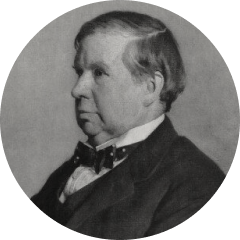Charles Whibley
(1859–1930)
Charles Whibley (1859–1930) took a first in Classics in 1883 from Jesus College, Cambridge, and embarked on a career as journalist, author and editor, and as a well-connected social figure (his intimates were to include Lord Northcliffe and Lady Cynthia Asquith). After working briefly for the publishers Cassell & Co., he wrote for the Scots Observer and the Pall Mall Gazette (for a while in the 1890s he was Paris Correspondent, a posting which enabled him to become acquainted with Stéphane Mallarmé and Paul Valéry), for the Daily Mail, and above all for Blackwood’s Magazine – where he produced for over 25 years a commentary, ‘Musings without Method’, comprised of sharp high-Tory substance and style. TSE hailed his column as ‘the best sustained piece of literary journalism that I know of in recent times’.
Richard Aldington jealously thought Whibley ‘a pernicious influence’ on Eliot:
Eliot was already too much influenced by Irving Babbitt’s pedantic and carping analysis of Rousseau – indeed to some extent he founded his prose style on Babbitt – and in Whibley he found a British counterpart to his old Harvard professor. Whibley was … a good scholar, but a hopeless crank about politics. He was the very embodiment of the English Tory don, completely out of touch with the realities of his time. ‘Whig’ and ‘Whiggism’ were his terms of contempt and insult to everybody he disliked, and anybody can see how Eliot picked them up. But Whibley took Eliot to Cambridge, where his conversation enchanted the dons and procured him friends and allies, vastly more important and valuable than the Grub Street hacks who had rejected him.
Whibley’s friend F. S. Oliver wrote (17 April 1930), in some personal reminiscences put down at TSE’s request, of
the apparently impulsive and prejudiced character of C. W. that when he came to deal with the craft of writing he had no favour, or fear, or anger for friends or enemies. I never knew him once to praise goodnaturedly a book because it was written by a very close friend; nor have I ever known him to dispraise a book with real merits, but which happened to be written by someone whose character and opinions he held in detestation. Contrary to the general idea of him he was one of the most tolerant people (as regards literature) that I have ever known … [I]t is this quality of truthful, courageous, penetrating, sympathetic literary criticism which I should put first among all his brilliant capacities… [H]e was I think the best critic who lived in my time.
Whibley’s books included William Pitt (1906), Political Portraits (1917, 1923), and Lord John Manners and his Friends (1925). See TSE, Charles Whibley: A Memoir (English Association Pamphlet no. 80, Dec. 1931).
